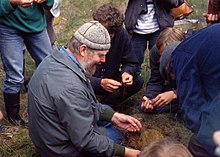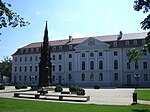
This List of people associated with the University of Greifswald contains notable alumni and faculty past and present of an institution of higher education founded as early as 1456.
Contents
- Nobel prize laureates
- Staff
- Arts and humanities
- Business and law
- Mathematics and sciences
- Medicine
- Theology
- Students
- Arts and humanities 2
- Business and law 2
- Mathematics and sciences 2
- Medicine 2
- Politics
- Theology 2
- Honorary doctorates
- Arts and humanities 3
- Business and law 3
- Medicine 3
- Theology 3
- Other
- References
- External links
If alumni subsequently worked at Greifswald University, they are listed under staff.








